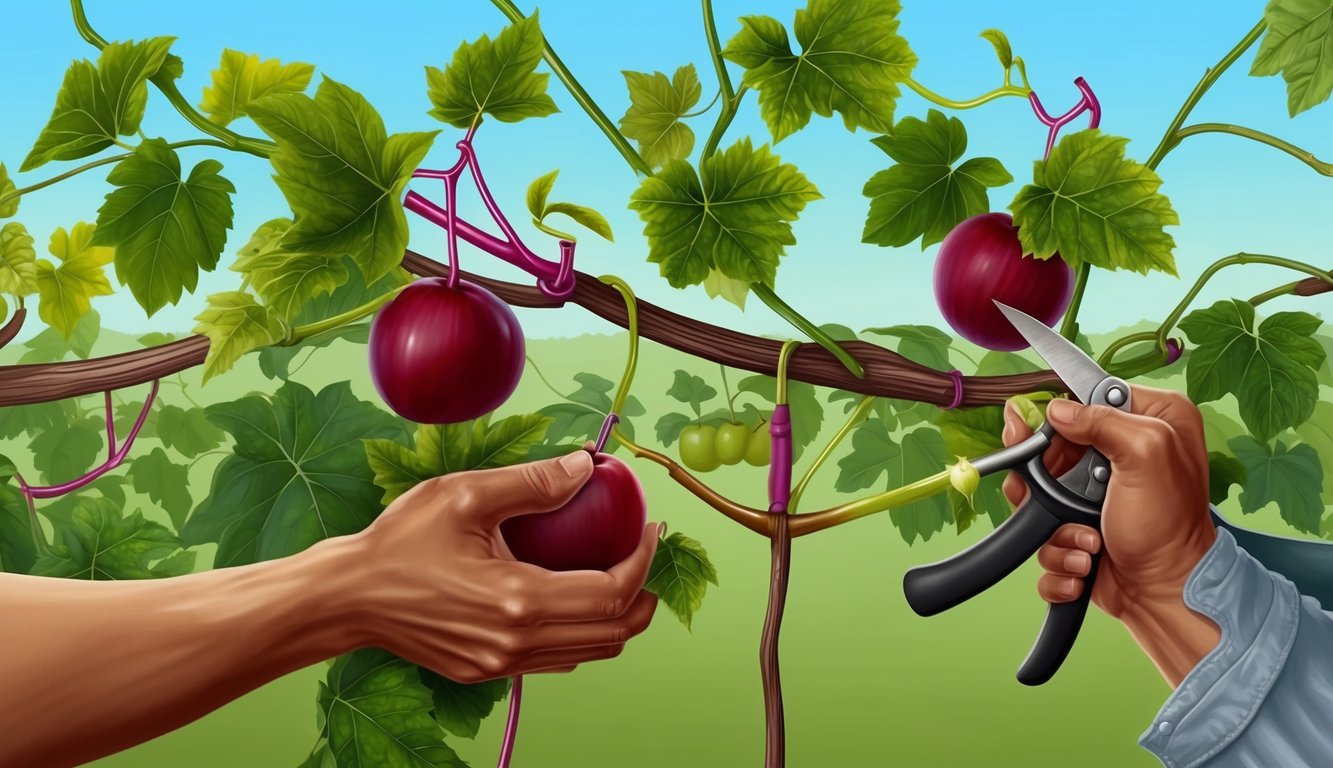Don’t Miss Out On This Unique Astrological Opportunity
Are you tired of spinning your wheels and getting nowhere? Simply put, you’re out of sync: you’re out of alignment with your astral configuration.
But: there’s a kind of map that can help you reclaim your alignment. Think of it as your own personal blueprint to success and happiness: a blueprint that will help you live your most amazing life.
Get started here.
In John 15, Jesus uses one of the most vivid metaphors: the image of the vine and the branches.
This chapter serves as a unique illustration of how faith and love can connect you to Jesus.
You will learn about the importance of remaining connected to Him, much like branches need a vine to stay alive and bear fruit.
Jesus shares with His disciples not just stories of love and commands, but also gives insights on how they relate to the world around them.
You are invited to reflect on what it means to abide in His love and keep His commandments.
This isn’t just a passive relationship; it’s active and demands your engagement.
Abiding in love, as described in this chapter, is not limited to words but includes actions that reflect genuine care and commitment.
Moreover, you’ll encounter the challenges that come with this close connection, especially in terms of the world’s reaction to the kind of love and faith Jesus talks about.
Your journey through John 15 will offer not just a spiritual lesson, but a guide to living a life filled with purpose and hope.
Key Takeaways
- You learn the importance of staying connected to Jesus, like branches to a vine.
- Abiding in love involves active engagement with His teachings and actions.
- You explore the relationship between His teachings and the world’s reactions.
The Metaphor of the Vine
In John 15, Jesus uses the metaphor of the vine to describe the relationships between Himself, His followers, and God.
By understanding this metaphor, you can see the importance of staying connected to Jesus and how God nurtures and cares for this connection.
Identity of the True Vine
Jesus identifies Himself as the True Vine.
This signifies that He is the source of life and growth for all believers.
As the vine, Jesus provides nourishment and strength to His followers.
When you stay connected to Him, you can grow and bear fruit, which symbolizes living a fruitful and faithful life.
Branches, which represent followers, cannot exist without their connection to the vine.
Without Jesus, there is no spiritual nourishment or growth.
This connection illustrates the dependence believers have on Him.
When the branches remain in the True Vine, they flourish and their lives reflect Jesus’s teachings and values.
Roles of the Father and the Gardener
God, the Father, is described as the Gardener.
His role is to care for the vineyard, which includes the vine and the branches.
As the gardener, God oversees the growth and health of the branches, ensuring they are fruitful.
He prunes branches to promote more growth, cutting away what hinders production.
This nurturing role means that God is actively involved in your spiritual development.
He removes obstacles and helps you focus on growing in faith.
Understanding this role shows how God carefully and lovingly supports your journey, shaping you to be more fruitful and effective in displaying His love and grace.
As you embrace His guidance, you will recognize His hand in every season of growth and refinement.
Just as the Matthew 21 triumphal entry demonstrated Jesus’ divine purpose and fulfillment of prophecy, your journey is also orchestrated to reveal His presence in your life.
Trust that His plans are leading you toward a deeper understanding of His love and a greater impact on those around you.
The Concept of Abiding in Love
Abiding in love is a key idea in John 15.
It emphasizes the importance of staying connected with Jesus.
This connection leads to growth and joy, and its absence results in various negative outcomes.
Importance of Remaining in Jesus
Remaining in Jesus is a crucial aspect of spiritual life.
When you stay close to him, you avail yourself of his love and guidance, which strengthens your faith.
Jesus talks about being the vine and believers as branches, highlighting how vital this connection is.
Staying connected means you not only receive nourishment but also flourish in your spiritual journey. “Apart from me you can do nothing,” underscores the fact that for a fruitful life, you’re encouraged to keep your relationship strong with Jesus.
Benefits of Mutual Abidance
When both you and Jesus abide in each other, the relationship becomes dynamic and fulfilling.
This mutual connection leads to an increase in love and joy in your life.
Feeling Jesus’s love helps you bear fruit like kindness, patience, and faithfulness.
Such a relationship transforms your life, filling you with joy that is complete and lasting. “That your joy may be full,” highlights how abiding in love enriches your daily experiences, offering you a sense of completeness and happiness.
Consequences of Not Abiding
Failing to abide in Jesus has serious implications.
Without this spiritual connection, you risk becoming spiritually dry, much like a branch that withers away. “Thrown away, withers, fire, burned,” are phrases that illustrate the fate of disconnected branches.
The lack of this connection can leave you feeling spiritually unfulfilled and vulnerable.
This emphasizes the importance of maintaining your bond with Jesus to avoid these negative outcomes and to continue bearing good fruit in your life.
Living Out the Commandments

In John 15, the key themes center around love and obedience.
You are encouraged to follow Jesus’ teachings by cherishing His commandments and showing love for others.
Obeying as an Act of Love
When you follow Jesus’ commandments, you demonstrate your love for Him.
Obeying is not just about doing what you are told.
It is about showing your dedication and attachment.
The idea is simple: if you keep His commands, you stay in His love, just as He stayed in the love of His Father.
This bond between love and obedience is essential.
It is not a series of rules you must follow; it is a heartfelt decision.
By living according to these commands, you are not only complying with His teachings but embodying them in your daily life.
Think of it as living with purpose, chosen to reflect His love in everything you do.
The Lasting Command to Love
One of Jesus’ most important teachings in John 15 is to love one another.
This commandment is direct and significant.
You are appointed to love your neighbors just as He has loved you.
This kind of love means caring, forgiving, and supporting others warmly and sincerely.
Imagine the impact of a community where everyone loves genuinely.
It’s a place where people feel accepted and valued.
This love is not fleeting or temporary; it is enduring and transformative.
By embracing this lasting command to love, you create a harmonious environment around you and invite others to experience the joy and fulfillment of loving and being loved.
Relationship with the World

As a disciple, your journey often includes navigating the complex relationship with the world.
This involves understanding the world’s response to discipleship and finding support in spiritual advocacy through the Holy Spirit.
The World’s Response to Discipleship
Scripture often highlights that the world may not welcome disciples of Jesus warmly.
It can react with hatred and even persecution.
This stems from the world’s rejection of Jesus himself, as noted in John 15:18-25.
By following Jesus, you might experience challenges and resistance because the world opposes the values you stand for.
It is important to remember that such reactions aren’t personal but are part of a broader spiritual struggle between worldliness and faith.
Being aware of this can prepare you to face such difficulties with strength and understanding.
Support in Spiritual Advocacy
Fortunately, you are not alone in this journey.
The Holy Spirit, also known as the Spirit of Truth, acts as an Advocate to help you.
The Spirit empowers and guides you to testify and bear witness of Jesus’s teachings, even when the world challenges your beliefs.
This divine support is crucial in maintaining your faith and commitment amidst worldly resistance.
The Holy Spirit not only comforts but also equips you with the truth that fortifies your resolve.
As you continue your path, leaning on this spiritual advocate allows you to navigate interactions with the world with confidence and purpose.
Frequently Asked Questions

In John 15, Jesus uses rich imagery to convey important lessons about relationships with Him.
The chapter explores themes of spiritual growth and the importance of staying connected to Jesus.
What is the main message of John chapter 15?
John 15 highlights the importance of remaining close to Jesus to lead a fruitful life.
Jesus emphasizes the necessity of staying connected to Him, as apart from Him, nothing can truly flourish.
The chapter urges you to live in harmony with Jesus’ teachings and love.
How is the symbolism of the vine and the branches explained in John 15?
The vine represents Jesus, and the branches symbolize believers.
This image illustrates the connection needed between you and Jesus.
As branches rely on the vine for sustenance, you depend on Jesus for spiritual nourishment and guidance.
What does Jesus mean by ‘fruit’ in the context of John 15?
In John 15, “fruit” refers to the good deeds and qualities that result from a close relationship with Jesus.
This includes actions like kindness, love, and patience.
When you maintain this connection, your life reflects these positive attributes.
How does the concept of ‘abide in me’ play a role in John 15?
“Abide in me” means to stay connected to Jesus continuously.
For you, this involves maintaining faith, prayer, and adherence to His teachings.
This deep connection allows for personal growth and transformation, leading you to live a life aligned with Jesus’ message.
In John 15, what are the implications of not bearing fruit?
Not bearing fruit signifies a lack of positive actions and spiritual growth.
This illustrates separation from Jesus.
Without this connection, you may struggle to exhibit the values and behaviors that are encouraged in His teachings.
Can you explain the relationship between the vineyard keeper and the branches described in John 15?
In John 15, the vineyard keeper, often referred to as God, oversees the care of the branches.
This symbolizes divine guidance and intervention.
The keeper prunes branches to promote health and productivity, reflecting how you might experience challenges that lead to personal and spiritual growth.



